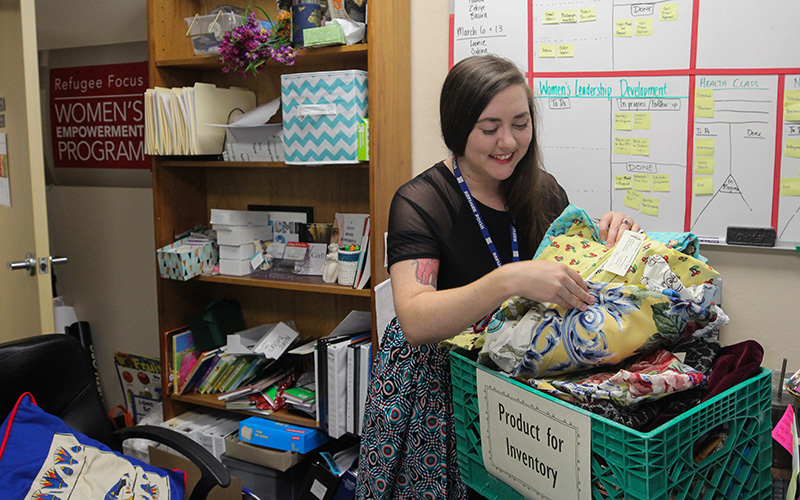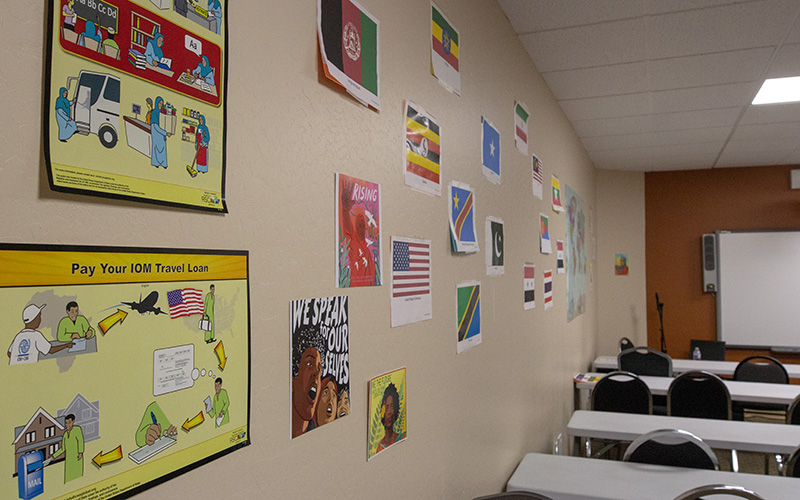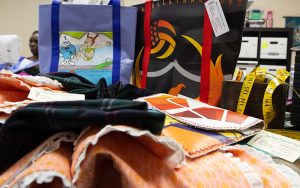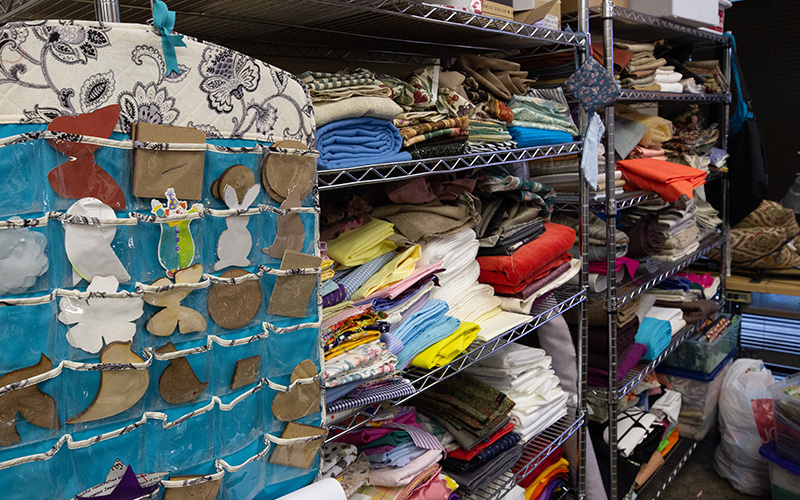
Rachel Bechdolt, women’s empowerment coordinator for Lutheran Social Services of the Southwest, looks through dozens of colorful bags that were made by refugee women during sewing classes. (Photo by Caroline Veltman/Cronkite News)
PHOENIX – During the farmer’s market on Saturdays outside Phoenix Public Market downtown, Rodain Abo Zeed sets up a quaint stand filled with falafel, fattoush, pastries, kubbeh and stuffed zucchini. Attendees stroll by under the afternoon sun, gazing at her exotic, hand-made Syrian dishes.
Rodain’s Syrian Kitchen is still a relatively new business. And although Abo Zeed works hard each week on her homemade creations, there is still one thing she doesn’t have: a sign.
It’s a big change from where she comes from.
Before the Syrian civil war, Abo Zeed was the head chef at her family’s restaurant in Daraa, a city in southwestern Syria.
And business was good. Customers filled the 50-table restaurant every day except Friday, the Muslim day of prayer. She remembers her favorite dish to make was cenefas de kataifi, a Greek pastry made with nuts and thin strands of dough covered in a sweet glaze.
It “was the place to go,” she said in Arabic through an interpreter.
Now, as a refugee living in Arizona, Abo Zeed has started a new life from scratch, under difficult circumstances and with what little help she’s been able to receive from humanitarian agencies that now are getting fewer federal funds.
When her restaurant burned down during the war, she and her husband fled with their two young children to Lebanon in 2009, where she inherited a restaurant from a family member. She said she was just getting accustomed to living there when her husband decided to move the family to the United States in 2016.
To pay for the travel expenses, Abo Zeed was forced to sell her restaurant, but the family’s hardships weren’t over.
Once in Phoenix, someone broke into the family car, stealing all their belongings and the jewelry and gold they had received as payment for the sale of the restaurant.
When she realized everything she owned was gone, Abo Zeed had a heart attack and spent the next 15 days in the hospital.
Abo Zeed describes herself as a strong woman, and she credits that strength with helping her survive that difficult time. She’s a woman who has protected two young children from a war, cared for them in a refugee camp tent in Jordan for two years, and finally was able to bring them to safety in Arizona.
She “drew a picture of America like it was going to be this great glamorous thing.”
However, reality did not match that picture.
Almost four years later, she said she has become acclimated to her new life. No easy feat, considering those who work directly with the refugees at resettlement agencies say it’s a much more difficult process for women than it is for men.
This is largely due to bearing the responsibility of child care, experiencing a higher rate of sexual violence, financial dependency, less access to education and lack of confidence.
Connie Phillips, CEO and president of Lutheran Social Services of the Southwest, a Phoenix nonprofit, said the needs of refugee women are high and exceed the basic services provided by resettlement agencies.
“Women who come from cultures where they haven’t worked, where they’ve lived in a more rural environment, where they’ve basically been in a village, are not very educated,” she said. “They have a really hard time adjusting to American culture.”
According to Phillips, women who are less educated have to work much harder to learn English. Not speaking the language can make it difficult to make friends, which can lead to social isolation.

In classrooms at Lutheran Social Services of the Southwest, refugees can take computer classes and get help obtaining GED diplomas. (Photo by Caroline Veltman/Cronkite News)
These women also struggle to find employment because of a lack of work experience. Many of them are the caretakers for their children and have carried the expectation to perform the traditional duties of wives at home.
When refugees do make it to Arizona, regardless of gender, they receive basic resettlement services including housing, food, cultural orientation, English classes and assistance in enrolling their children in school.
But these resources often fall short and exacerbate the difficulties these women face.
New challenges
Phillips said the federal government is granting less money than ever before to resettlement agencies, which correlates to the number of refugees the agencies resettle. A lower cap on refugees means fewer dollars. The cap on refugees admitted into the United States is the lowest since the establishment of the Refugee Act of 1980.
In 2008, 3,392 refugees arrived in Arizona. In 2018, that number dropped to 1,054, according to the Refugee Processing Center.
“It’s very concerning from the standpoint of … we’re facing the largest refugee crisis in history,” Phillips said.
Abo Zeed attended school in Syria until ninth grade. Although she wanted to continue her education, her parents prioritized work over school.
Today, she is slowly learning English and attends language classes in north Phoenix four days a week while her three children are at school. She said she enjoys school and likes being a student again.
It wasn’t always like this, however. In the beginning, Abo Zeed struggled to work and attend classes because she couldn’t afford child care. She also couldn’t afford any furniture and her family slept on the floor of their bug-infested apartment. They had no money for rent. A neighbor had to step in, paying two month’s worth.
“It’s a tough life,” Abo Zeed said.
Many refugee women find themselves in precarious situations like hers.
Which is why Rachel Bechdolt, women’s empowerment coordinator for Lutheran Social Services of the Southwest, created a unique program for refugee women in 2015 to help relieve some of their stress.
A new beginning
The Women’s Empowerment Program includes child care, sewing, computer and leadership classes, and art therapy. Bechdolt said she chose these classes to fit within the refugee women’s cultural background, and also to develop skills they could apply at home.
Bechdolt designed the program based on extensive research from studying post-genocide restoration in Rwanda, working in the Arizona Refugee Resettlement Program and the Peace Corps.
The classrooms are relatively quiet, as the volunteers often don’t speak the same language as the women, which can be Arabic, Rohingya, Kinyarwanda, Kinyabwisha, Swahili, Kachin, Dari and Tigrinya. They communicate through movement and the few words they understand in common.

The Refugee Women’s Empowerment Program offers several skill-building classes. In sewing class, the women make tote bags, purses, coffee cup cozies and more. (Photo by Caroline Veltman/Cronkite News)
Eighteen women – from Chad, Somalia, Iraq, Democratic Republic of Congo, Afghanistan, Burma and Eritrea – are enrolled in the program. They came to the United States fleeing what Bechdolt described as “hell on earth:” rape, oppression, warfare and violence that many call genocide.
In the sewing classroom, industrial shelves stacked with patterned fabrics, bags, computer cases and place mats line the walls, each with tags containing the name of the woman who made it and the country she is from.
After volunteers teach them how to sew and they complete their projects, Lutheran Social Services of the Southwest sells the products at markets and their online site. The woman who makes the product gets 80% of the proceeds.
In class, the curriculum of the computer course down the hall focuses on the fundamentals of computer use: how to turn the computer on and off, operate a mouse, use maps, email, make a resume and search the internet. All of which are difficult for adults who have never used a computer before.
And in the women’s leadership class, Bechdolt invites financial experts as guest speakers to explain such topics as the concept of credit, something that does not exist in many of their home countries.
The women, some wearing a variety of traditional attire, hijabs and modern American dress, listened intently to the experts and laughed with their friends.
“I just see how happy they are to come to the programs and I see how it really impacts them so much,” Bechdolt said. “They’re so happy to come and participate.”
She said many of the refugee women also attend the classes to escape isolation at home.

These colorful bags are sold to online vendors, and 80% of the proceeds goes directly to the refugee women who made them. (Photo by Caroline Veltman/Cronkite News)
One woman in the program, who Bechdolt referred to as Faisia, grew up in a Taliban-controlled region of Afghanistan and was not allowed to attend school. She did not learn how to read or write. She came to the United States in her 50s with her four children. Her husband had to stay behind because they did not have the papers to prove their marriage to authorities. She could not speak English.
But now she attends the sewing class every week, and Bechdolt said Faisa’s sewing has improved greatly. She earned a sewing machine to take home, learned English, and translates for volunteers and other women in the class.
When Bechdolt asked why she continues to come to the sewing class, she said Faisa responded, “When I’m at home, I just think and think and think.”
Bechdolt and the volunteers of the Women’s Empowerment Program can’t help the refugee women to the extent they would like. The program is limited by scarce financial resources, and it receives no funding from the government.
“There’s definitely programming that we would like to expand on that we’re kind of restricted,” Bechdolt said, “We could do more if we had more financial support.”
Kate Cameron, leadership program manager for Safed House, said the refugee women she works with are stifled by loneliness.
“(The women) are finding they are isolated,” Cameron said, “Without transportation and without work, I think a lot of them are spending time alone at home and a lot of them are wanting to be with women of similar background.”
Safed House, a non profit organization that helps refugees share their stories, has a program exclusively for refugee women to talk freely and without judgement about their journey and socialize with others who have been through similar circumstances.

The sewing classes provide dozens of colorful fabrics, sewing machines and other supplies that women use to create a range of products. (Photo by Caroline Veltman/Cronkite News)
“I can only imagine that if you live through something really, really horrific, that to be able to sit with someone else who has lived through a similar experience, there’s got to be something that’s binding,” Cameron said. “It’s probably somewhat profound to be with another human being and be in their space and that they can truly understand what you’ve been through.”
Cameron adds some of the stories shared in the circle include stories of war, giving birth under difficult circumstances and experiencing prejudice.
The women from Syria, Iraq, Afghanistan and Palestine sit with a translator, a therapist, Cameron, and Safed House co-founder Susan Assadi. They discuss their past, what they value in life and their goals. Through these conversations, Cameron recognized the same issues throughout the group: not knowing English, difficulty finding jobs and finding child care.
For now, Safed House has been forced to stop hosting Sharing Circles due to a lack of resources. The organization also does not receive any federal funding and Cameron and Assadi were unable to transport the women to and from their homes. Many of them do not have cars or driver’s licenses.
Abo Zeed attended the previous Sharing Circles, and shared her difficulty journey fleeing Syria, surviving harsh winters living in a tent with two young children, and being robbed of everything she owned. She said telling her story helped her heal and begin her new life.
She’d like to attend the Sharing Circle again, but the program’s fate is uncertain.
Susan Assadi said she saw Abo Zeed grow more self-assured during her time there.
“Now, when I speak to Rodain, not just because of the work with Safed House, but I think the growing confidence from gaining our support,” she said, “I think we somehow had a role in helping her become more self-sufficient.”
Cameron agreed: “She’s spectacular. She is someone that you just wake up every day and you go, ‘Wow. You’re so resilient.'”
Abo Zeed said her biggest obstacle right now is getting a sign for Rodain’s Syrian Kitchen. She will push through, she said, just as she has all her life.
“I’ll make it. Just tell me where to go.”
AlertMe